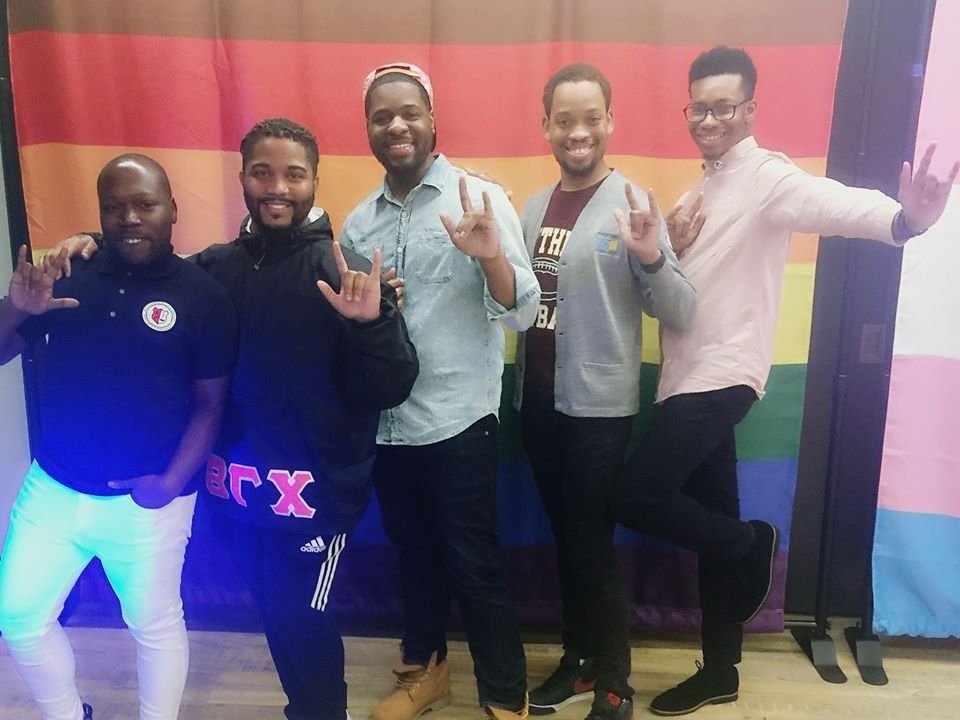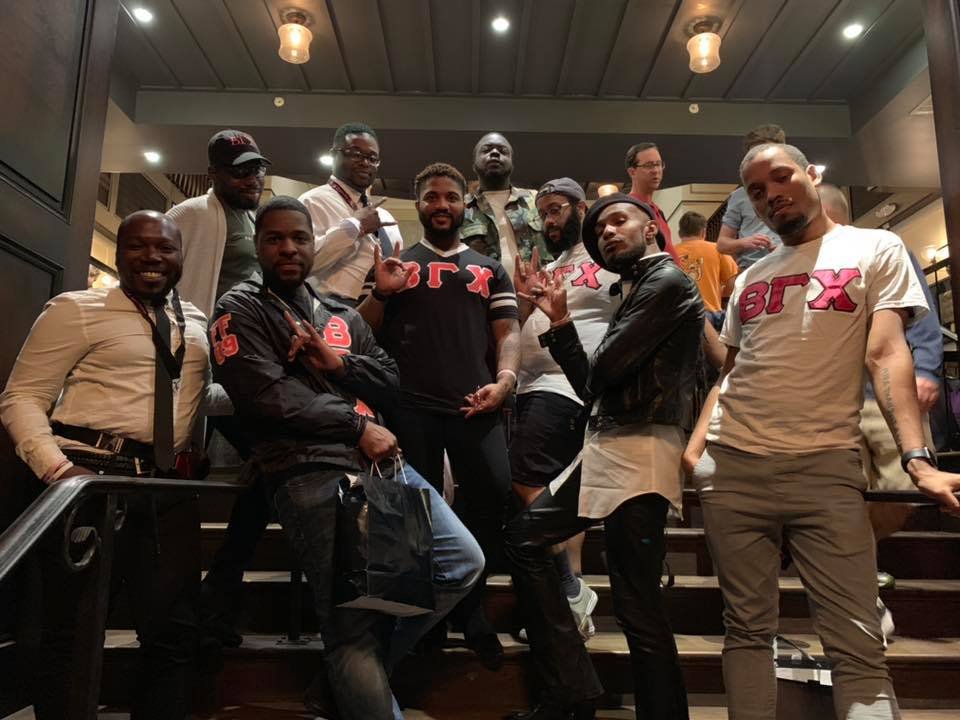A Home For Everyone: The Radical ‘Siblinghood’ of LGBTQ+ Fraternity Beta Gamma Chi

It’s tempting to argue that there is no longer a need for Black Greek organizations, but it becomes a harder sell when one examines the leaders these organizations have produced—Huey P. Newton, Vice President Kamala Harris, Dr. Martin Luther King Jr., and MC Lyte are just some of the luminaries.
Commonly referred to as the “Divine Nine,” members of Black Greek letter organizations have been at the forefront of social change in the Black community for over 100 years. Being LGBTQ+, out, and a member of one of these organizations can be challenging. Despite sometimes feeling like an “other,” queer folks have found ways to navigate these challenges, even rising into various prominent positions in their respective organizations. One seed that’s grown out of these traditions is the emergence of Black LGBTQ+ Greek letter organizations like Philadelphia-based organization Beta Gamma Chi.
Similar to the Black Greek letter organizations that preceded them, these fraternities and sororities also center community, education, and leadership, giving Black LGBTQ+ folks an alternative to Divine Nine organizations by providing spaces that affirm and embrace their sexual orientation, gender identity, and expression.
“We had no idea what we were doing. We had no idea what it would become,” said Gerald Dessus, co-founder of Beta Gamma Chi.
Dessus, along with Beta Gamma Chi co-founder, Dr. Khyle Wooten, and Anthony Fluellen are former members of Lincoln University’s Concert Choir. At the time, the famed choir was led by Dr. Albert Lee. It was through Dr. Lee’s mentoring that the three friends learned important life lessons.
“I didn't realize that at the time, but [Dr. Lee] would invite Kyle, Anthony, and me off-campus. We would go to Applebee’s or Olive Garden, and just talk,” Dessus said. “We would talk about everything—nothing was off-limits. He was just pouring into us.”
“I felt that if I had to suppress in any way my sexuality, after finally getting to a place where I felt comfortable, I didn’t want to. I didn’t want to be a part of an organization and feel like I had to hide that.”
Through these experiences, the young men developed a bond and more self-confidence. They wanted other Black queer people on campus to have the same level of support they were receiving. They wanted incoming freshmen to know that they had a community at Lincoln to support them.
The option to join Divine Nine organizations existed, but Dessus was steadfast in his need for safety.
“I felt that if I had to suppress in any way my sexuality, after finally getting to a place where I felt comfortable, I didn’t want to,” he said. “I didn't want to be a part of an organization and feel like I had to hide that.”
The young men began developing a new fraternity, one that centered on a longing for home and connection to one another—a Black queer fraternity.
Real Siblings Wear Pink
Founded in 2009, with a flamingo mascot and the audacity to include pink as one of its core colors, at their foundation, Beta Gamma Chi was created as a haven of deep love and affection for all those interested.
“We don't want anything from you,” Dessus said. “There are no strings attached. We just want to be a resource. As you navigate different spaces, we're here.”
Others wanted in, and before they knew it, the group grew beyond its borders at Lincoln University, where they were never officially chartered, but maintained a presence.
“We don't want anything from you. There are no strings attached. We just want to be a resource. As you navigate different spaces, we're here.”
- Gerald Dessus
After years of steady growth, in 2018, the organization made a bold decision. Traditionally, fraternities have used the term “brothers” as a way to describe fellow members. Beta Gamma Chi didn’t want to be like every other fraternity. They wanted to ensure that their policies and practices were welcoming to men of trans experience and non-binary individuals. So they updated how they greet fellow members. Instead of referring to each other as brothers, they would use the inclusive and preferred greeting of “siblings.”
“It just allowed us to really say, if we are a queer organization, we accept all of us. It was no longer, we're doing this because this is the path that was set by the organizations before us,” said Dessus. “Like, no, what do we want to do? No matter how people see us, no matter what they think, we're doing this because of family.”
Finding Home
When you hear the word “home,” for many, it immediately conjures up images of family. Queer people often create chosen families to survive. Finding home and family can be a life-saving, radical act.
Trinitee Wilson had always been interested in joining a fraternity.
“I really always rather join the sorority,” they gently assert through laughter.
Wilson moved from Rochester, NY to Philadelphia. Growing up sheltered, they didn’t have the language to describe who they truly were until they moved to the city.
“It wasn't until I moved to Philadelphia that I even found other terminologies [to] identify as non-binary,” they said. “It was never presented to me, and I never thought to myself that there could be more.”
They learned about Beta Gamma Chi from a friend and were then connected to Dessus. And once that moment happened, they didn’t want to let go. Wilson joined the fraternity in 2019 and made an immediate impact.
“I created a campaign, and it was for International Non-Binary Week. I made it a point for each non-binary person that was a part of the fraternity, at the time, to [tell] people who they were, and why they joined,” they said. “Visibility is so important.”
“I made it a point for each non-binary person that was a part of the fraternity, at the time, to [tell] people who they were, why they joined and all of that. The visibility is so important.”
When asked what they were most proud of about their membership in Beta Gamma Chi so far, Wilson said, “Honestly, Sheldon,” as they fought back tears.
Sheldon Fisher grew up in Queens, NY, to parents of Caribbean descent. He was naturally musical and was interested in dance. While his cousins were into basketball and football, as a child, Fisher’s father wanted the same interests for him. His mother would often intervene.
“My mom was like, no, let him be free in his expression and do what he wants to do,” Fisher recalls.
Incredibly shy as a high schooler, Mr. Piccirillo, Fisher’s teacher, also encouraged him.
“I remember my first parent-teacher conference, he told my mom, ‘Sheldon has the ability to lead this section, but he just has to believe in himself and has to believe that he can do it. He has the talent, it's just the confidence that he has to work on'.”
Fisher never forgot this experience.
After high school, he found himself on Lincoln’s campus, singing in the choir. He didn’t know about Beta Gamma Chi and didn’t join until after graduation several years later.
“There was just like this infectious love that came in. It was so loving and family-oriented. It was really amazing to just see,” he said.
“There was just like this infectious love that came in. It was so loving and family oriented. It was really amazing to just see.”
Fisher joined Beta Gamma Chi in 2020.
“I can help someone else. So many people helped me, and I just give back in service in that way,” he said. “Even if it's a little thing, it's transformative, and I know that really can impact someone's life for the better.”
Wilson believes every Black queer person should know about Beta Gamma Chi for a simple universal reason—”because everybody deserves a home.”
Cover photo from L to R: Sheldon Fisher, Elijah Brittingham, Darin Earl and Anthony Cunningham (Spring ‘20 - Visionaries. Image courtesy of Sheldon Fisher.)
Johnnie Ray Kornegay III (aka Jay Ray) serves as Deputy Director of Strategy and Impact for The Counter Narrative Project (CNP), an organization committed to countering narratives and speaking truth to power. In addition, he is co-host and producer of the podcast Queue Points, a visual podcast where he and his co-host, DJ Sir Daniel, inform and celebrate Black Music creatives through meaningful dialogue.
Connect with Johnnie: Facebook | Instagram | Twitter | LinkedIn


